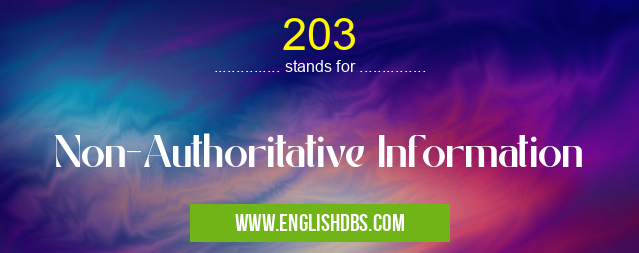What does 203 mean in HTTP ERROR CODES
203 is an HTTP status code used by servers to communicate with browsers that a response has been received, but the actual content is not from an authoritative source. This is sometimes referred to as a “Non-Authoritative Information” response status code. 203 responses are commonly used for proxied requests. When a browser sends a request to a server, it may be sent through a proxy server first. The proxy server will then forward the request on to the web server, and receive a response back in turn. If that response is a 203, it means the information returned from the server is not authoritative, but instead based on another information source such as cache or database records.

203 meaning in HTTP Error Codes in Internet
203 mostly used in an acronym HTTP Error Codes in Category Internet that means Non-Authoritative Information
Shorthand: 203,
Full Form: Non-Authoritative Information
For more information of "Non-Authoritative Information", see the section below.
What does 203 Stand for
203 stand for “Non-Authoritative Information” which means that the entity body sent with this response contains information gathered from non-authoritative sources (i.e., 3rd party) versus authoritative sources (i.e., original). A 203 response tells the client that there was no error in processing their request, and they should continue asking for the same resource in their next request.
Essential Questions and Answers on Non-Authoritative Information in "INTERNET»HTTPERRORS"
What is non-authoritative information?
Non-authoritative information is data that has not been verified or confirmed by an authoritative source. It may be unreliable, outdated, or incomplete, and may be based on opinion or speculation rather than facts. It is important to check the accuracy of any non-authoritative information before relying on it for making decisions.
Is non-authoritative information always inaccurate?
Not necessarily – non-authoritative information can also be accurate and up to date. However, it is important to verify any non-authoritative information before using it as a reference.
What are some examples of non-authoritative sources?
Examples of non-authoritative sources include blogs, online discussion forums, social media posts, and other user generated content. It is important to be aware that these sources may contain inaccurate or outdated information and should not be relied upon for fact checking.
How do I know if a source of information is authoritative?
There are several ways to identify authoritative resources; look for official government websites or publications from established organizations such as universities or research institutions. Authority sites often have contact details which can help you verify their credentials further if necessary.
How can I ensure the accuracy of non-authoritative sources?
If you are relying on non-authoritative sources for research or decision making, make sure you double check any facts with an authoritative source first. Additionally try to obtain corroborating evidence from multiple different sources to confirm the accuracy of the information.
Should I avoid using non-authoritative sources altogether?
While it is important to exercise caution when using non-authoritative resources due to potential inaccuracy, they can provide useful insights into current trends and opinions which may not be available from more reliable sources. As long as you take steps to validate the accuracy of the data you use then it can still form part of your research process.
Is user generated content considered non-authoritative?
Yes user generated content such as blogs, discussion forums and social media posts are all considered non-authorative as they are not verified by an established authority figure. This means that the data contained within them must still be checked for accuracy before being used in any formal research.
Who provides authoritative information?
Authorized figures such as governmental bodies at various levels, universities and research institutions will all provide verified data regarding various topics which can serve as a more reliable source of accurate information than other forms untested sources.
Final Words:
In conclusion, 203 status codes signify Non-Authoritative Information and provide an indication to clients that they should continue requesting resources at their own risk using what they have already retrieved from non-authoritative sources such as cache or databases records rather than relying solely on official records. Although these types of responses generally indicate successful requests, it’s important to remember that they don't guarantee accuracy or high quality data since these responses do not originate from authoritative sources.
